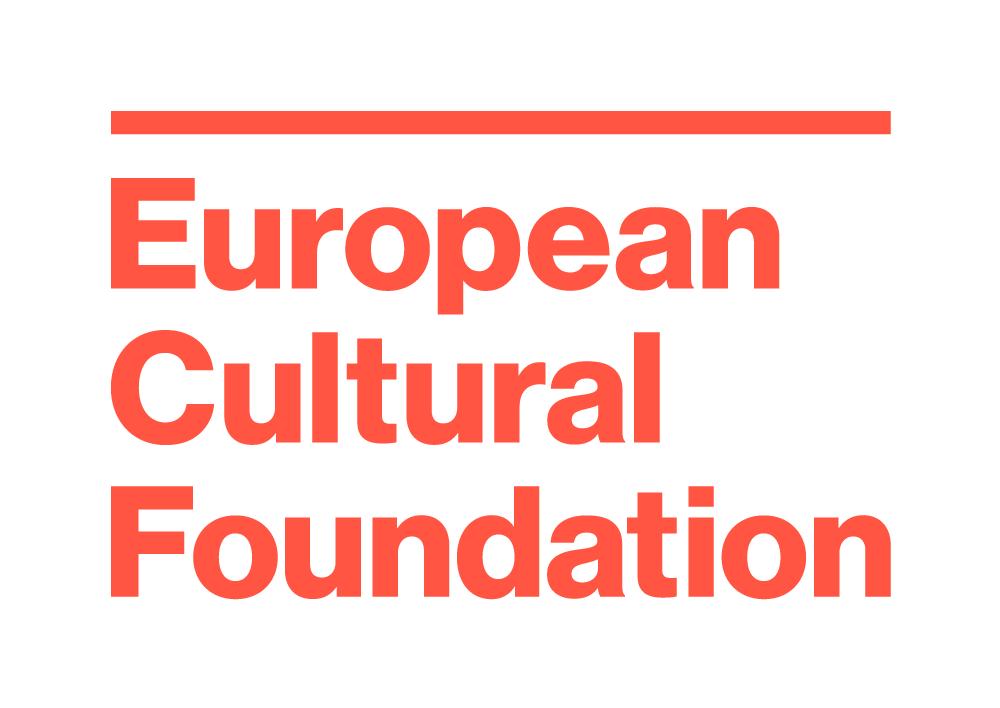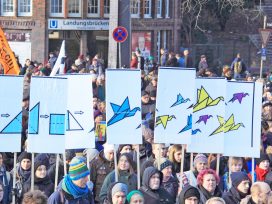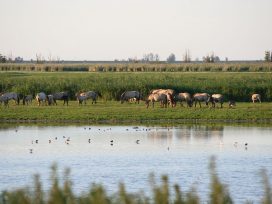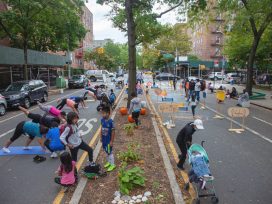Towards commoning institutions in, against and beyond the ‘Greek crisis’
Beginning in Athens’ Syntagma Square in summer 2011, a new wave of anti-austerity protest swept across Europe. Commoning practices became crucial to sustaining these movements’ momentum. Lazaros Karaliotas considers the implications for reorganizing urban life today.
Since the outbreak of the so-called ‘Greek Crisis’, Greece has frequently attracted headlines in the mainstream media, as well as much political interest and academic analysis. The details of successive ‘bailout agreements’, the devastating implications of severe austerity measures, the rise of the Neo-Nazi Golden Dawn, the squares movement, the successive electoral wins of Syriza in 2015, and the ‘No’ vote in the July 2015 referendum on the loan agreement proposed by the country’s creditors, have captured the public gaze and generated major debates. But less attention has been paid to the everyday urban politics that are unfolding in the midst of the crisis.
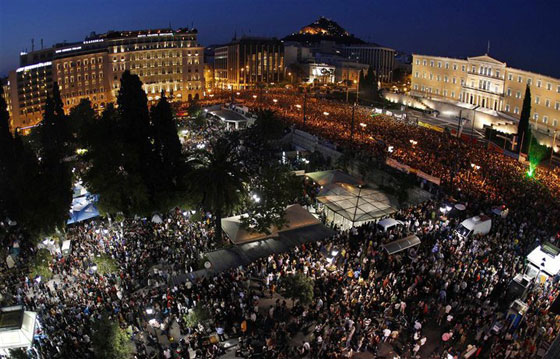
Greek uprising, Athens, 29 May 2011. Photo: Kotsolis. Source: Wikimedia
Since the emergence of the squares movement during the summer of 2011, the urban fabric of Greece has been the crucible of a profusion of emancipatory political experiments revolving around alternative ways of collectively self-organizing urban everyday life. I want to focus here on the possibilities that such experiments open up, as well as the challenges and limitations they face in ‘articulating alternative publics’ – to put it in the terms of the brief for this discussion.1
Living the ‘Greek crisis’
Six years of dogmatic neoliberal austerity measures, imposed by successive governments and by the European politico-economic elites, have left their mark on the Greek urban landscape. Statistical indicators are unable to convey the magnitude of the socio-economic collapse that has been experienced, or the embodied experiences of loss and trauma that have been visited upon Greeks – and even more so on the immigrants living in the country. Between 2009 and 2014 real GDP shrank by 25.5 per cent, while 4 out of 10 citizens currently survive below the 2009 poverty-line.2 Unemployment skyrocketed from 9.6 per cent in 2009 to 26.5 per cent in 2014, reaching the level of 1.3 million unemployed. Unsurprisingly, young people and women are worst hit, with rates climbing to 52.4 per cent and 30.2 per cent respectively.3 And there has also been a series of privatisations, and the retraction of social and labour rights, which has led to worsening levels of precarity, particularly for immigrants, women and young people. Furthermore, recurring cuts in wages and pensions (at rates of between 35 per cent and 50 per cent), the axing of welfare spending in areas like education and health, and the introduction of numerous emergency taxes have led to a sharp increase in the relative cost of urban life, and to widespread experiences of vulnerability and precarity.
At the same time, an authoritarian turn has marked the country’s political life after 2010. Formal democratic procedures had been repeatedly bypassed in the name of emergency and economic necessity, and many political mobilizations, including the squares movement, were met with police brutality. And this turn at the institutional level was accompanied by the resurgence, and sometimes temporary hegemony, of racist and exclusionary discourses in the public sphere.4 Such discourses were many times translated into violent attacks against immigrants, both by the Neo-Nazis of Golden Dawn and the police.
The thousands of homeless people struggling for survival in the streets of Athens and Thessaloniki and the violent attacks against immigrants are the two most visible symptoms of a bio-political regime that has inflicted multiple vulnerabilities and striven to foreclose the spaces for democratic disagreement and creativity.
From the squares to the urban fabric
At the same time, this regime has again and again been confronted by emancipatory political events and experiments. The squares movement is the most well-known of these. Indeed, the squares movement was unprecedented in the country’s political history since 1974 and the downfall of the military Junta. Between May and July 2011, a multitude of protesters from widely varying socio-economic backgrounds and politico-ideological outlooks – often even conflicting – occupied Syntagma square in Athens and many other squares across the country, to express their strong disagreement with the actions of the regime. The movement represented a peak in the struggle against austerity, and undeniably contributed to the thorough de-legitimization of the up-to-then ruling parties of social-democratic PASOK (Panhellenic Socialist Movement) and conservative ND (New Democracy). As Marina Prentoulis recently argued in the pages of Soundings, it also played a key role in the sharp increase in Syriza’s electoral influence leading to its twin electoral wins in 2015.5
More importantly, the squares movement was also, despite internal splits and tensions, a performative critique of existing liberal-democratic institutions, and was articulated around new modes of saying, being and doing in-common. Protesters in the squares reclaimed urban public spaces from their allotted role in the neoliberal and post-democratic order to open up new political spaces and co-produce spaces in-common. In Syntagma, a whole other scene of collective self-organization was assembled to maintain and support the movement: a Popular Assembly as a direct democratic space for discussions and decision-making; a media centre and a radio station; a neighbourhood organization centre that co-ordinated similar activities in various parts of the city; a makeshift camp for the protesters sleeping in the square; stations covering the protesters’ daily needs and extending their solidarity to vulnerable urban dwellers by offering food and clothing; a first-aid station; a performing arts centre; and a number of thematic groups. And it is in these spaces that protesters also started to explore ways to spread the movement into popular urban neighbourhoods, workplaces and other key sites of the city. The aim was nothing less than to put in place an alternative network of organizing urban everyday life. As a result, when the mobilization gradually petered out, in the face of repeated brutal attacks by the police, the movement did not dissolve but was instead transformed into a series of experiments throughout the urban fabric.
The squares movement inspired and fuelled the ongoing efforts to create new forms of self-organization and self-management of urban life. A wide range of experiments of this kind are proliferating in its aftermath: social solidarity health clinics and pharmacies as well as solidarity support networks for the homeless, immigrants and refugees; workplace occupations, work collectives and self-management efforts by workers; social groceries, social currencies, time-sharing banks and cooperative networks that bypass ‘middlemen’ in the distribution of products; as well as social centres and housing squats. This incipient network of emancipatory socio-spatial experiments draws its inspiration from the practices explored in the squares and aspires to a new mode of urban life articulated around equality and collective self-governance. What is more, these initiatives are also filling their ranks with a new generation of activists who were brought together through the politicized solidarity that was forged in and through the squares. Interestingly enough, similar (albeit historically and geographically differentiated) experiments are proliferating in the aftermath of the outbreak of the 2008 crisis and the concomitant eruption of urban uprisings across the globe. What, then, are the political potentialities that such experiments open up, and what challenges and limitations do they face?
Towards commoning institutions?
As a starting point for exploring this question it is important to stress that these experiments are doing more than weaving a safety-net against the implications of austerity: they represent an embodied and ongoing exploration of alternative ways of organizing urban life. They reflect the desire to create something durable, something that could move beyond spectacular (urban) uprisings and single-issue-based struggles. They effectively ask, in Massimo de Angelis’ phrase: ‘how do we move from movement to society?’6 In their effort to spread out to the urban fabric such experiments put forward an alternative political imaginary around institution-building; around what the (urban) public might be and how to (self-)organize it.
This imaginary foregrounds practices of commoning in the face of the withdrawal of public resources and increasing vulnerabilities. And here the common and commoning have a twofold meaning: on the one hand, commoning practices affirm people’s right to use the commons as resources to fulfil their basic needs and live their everyday lives; on the other, precisely through these practices, the common also becomes a field wherein new forms of (urban) life are generated through multiplicity and difference.7 The incipient commoning institutions that are emerging throughout the Greek urban landscape are re-imagining the urban as a common field. They struggle to protect the commons of urban space, culture, information, education and health care provision from privatization and enclosure. More importantly, their everyday practices collectively produce alternative urban publics against and beyond the logics of the market and the state. In this sense, they can also be perceived of as ‘institutions of commoning’.8
However I do not want to romanticize these experiments, or urban commoning as a political strategy. Building, sustaining and expanding commoning institutions are not without their challenges and limitations. I want to briefly touch upon three interrelated challenges in relation to the articulation of alternative publics.
Firstly, a key question is that of the way in which the community of commoning (or the public) is construed. Reclaiming the commons from their allocation in the neoliberal and post-democratic order does not necessarily lead to emancipatory politics. New forms of enclosure and different exclusionary lines might be (re-) produced if the common is identified with any particular and closed community. In order to fuel emancipatory politics through sharing and encounters, emerging commoning institutions need to make every effort to be open to ‘newcomers’: to allow new subjects, voices, concerns and ideas to surface.9 In practice, of course, ideological rigidities and spatial, temporal and financial constraints always place limits on who can participate in commoning practices, and this has an impact on their openness.
Secondly – and this too is related to the issue of openness – there is a further challenge in moving beyond the confines of self-enclosed experiments. Whilst the formulation of a network of solidarity initiatives across Greece has been one of the most promising developments over the past five years, these links are still fragmented and fragile, as the majority of commoning experiments remain largely confined within their particular agendas, practices and understandings. Such links are even more fragile, although certainly present, when it comes to the relations between Greek experiments and similar practices outside Greece in Europe and beyond.
Finally, perhaps the most important challenge for commoning institutions, as it has emerged from the Greek experience, is that of the power relations within which they are embedded. From the squares movement onwards, a number of commoning experiments – including the occupation and self-management of the country’s Public Broadcasting Service (ERT) in Athens, social centres, anarchist squats and more recently refugee housing squats – have been evicted by the police from their operating spaces. Participants have resisted these evictions, but they were not unexpected, and were seen as an inevitable problem. Syriza’s electoral victories subsequently introduced an interesting twist to the question of relations between commoning experiments and the state. ERT, for example – which operated as a self-managed TV and radio station after 2013, when the New Democracy government shut down the service and fired all of its 2700 workers – re-opened as a public institution after Syriza’s electoral victory. And a number of co-operatives and solidarity initiatives that were already set up are now becoming part of the state’s strategy for ameliorating the consequences of the crisis. While not a problem in itself, this risks reducing solidarity initiatives to instances in the micro-management of social problems and fragmented communities.
These challenges and limitations should not, however, be read as reasons to dismiss the emancipatory potential of commoning institutions. Although always faced with tensions and challenges, commoning institutions are imperfect but nevertheless important experiments in moving beyond simple resistance to increasing exploitation and vulnerability whilst articulating alternative political imaginaries and forms of organization. The network of grassroots solidarity with refugees and migrants, spreading from the Greek islands through urban centres to the borders and throughout Europe, is a case in point. Its role in supporting migrants and refugees, its multi-faceted entanglements and tensions with the state at various scales, as well as its internal limitations and contradictions, attest to the importance of such practices; it encapsulates many of the questions that I have raised above, and also poses important new ones. How to better respond from an emancipatory perspective, of course, remains an open question. But it would definitely require: daring imagination, rigorous organizational innovation and a commitment to the inherently open logic of equality.
This article was first published as a contribution to a roundtable discussion in Soundings 64 (2016) entitled ‘Rethinking public ownership’.
Institute of Labor-GSEE, ‘Annual Economic Outlook 2015: The Greek economy and employment’, INE-GSEE 2015.
“Eurostat picture”, European Urban Database: http://ec.europa.eu/eurostat/data/database. For an illuminating account of the gendered implications of the ‘Greek crisis’, see Dina Vaiou, ‘Tracing aspects of the Greek crisis in Athens: Putting women in the picture’, European Urban and Regional Studies 18, no. 2 (2014).
Indicative in this respect is the publication of the mugshots of AIDS-HIV positive sex-workers; their vilification as a ‘hygiene bomb against Greek families’ by the then Minister of Health Andreas Loverdos; and their subsequent castigation by the mainstream media. The documentary Ruins, directed by Zoe Mavroudi, tells the story of this witch-hunt: https://www.youtube.com/watch?v=LlbL4sQ3_Fo
Marina Prentoulis, ‘From the EU to Latin America: Left populism and regional integration‘, Soundings 63 (2016)
Massimo de Angelis and Stavros Stavrides, ‘On the Commons: A public interview with Massimo De Angelis and Stavros Stavrides’, An Architektur 23 (2010)
Michael Hardt and Toni Negri, Commonwealth, Harvard University Press 2009; Alex Jeffrey, Colin McFarlane and Alex Vasudevan, ‘Rethinking enclosure: Space, subjectivity and the commons’, Antipode 44, no. 4 (2012)
Gigi Roggero, ‘Five theses on the common’, Rethinking Marxism, 22 March 2010
Jacques Rancière, Dissensus: On Politics and Aesthetics, Continuum, 2010
Published 22 February 2017
Original in English
First published by Soundings 64 (2016)
Contributed by Soundings © Lazaros Karaliotas / Soundings / Eurozine
PDF/PRINTPublished in
In collaboration with
In focal points
Newsletter
Subscribe to know what’s worth thinking about.
Related Articles
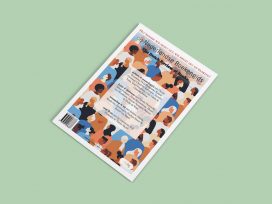
On making commons concrete
The Dutch Review of Books 2/2021
‘The Dutch Review of Books’ presents: the commons, vying for legitimacy between state and capitalism; the void of societal responsibility for #MeToo; and African oral traditions evident in rap music.
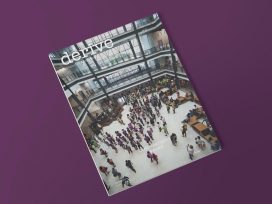
Democratic ‘Third Places’
dérive 10–12/2020
Urbanist magazine ‘dérive’ on emancipating Brazilian museology; the potential for Polish cultural centres; Swiss commons as a transferable prototype; and post-explosion Beirut.
